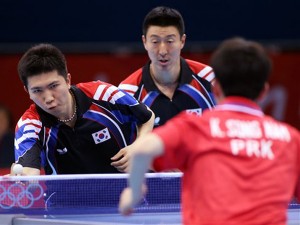
Ryu Seungmin, left, and Oh Sangeun of South Korea compete against North Korea during men’s team table tennis competition at the 2012 Summer Olympics, Saturday, Aug. 4, 2012, in London. AP/Sergei Grits
LONDON — In one of the most politically charged showdowns of the Olympics, South Korea defeated North Korea in men’s table tennis Saturday.
The tense match was closer than expected, with second-seeded South Korea winning the team competition 3-1 to reach the quarterfinals. The two countries, still technically at war, were playing a game that has often tried to bring them together.
Also among the men, top-seeded China defeated Russia 3-1 and advanced to the quarterfinals. China has already won gold and silver medals and men’s and women’s singles. It is favored to win both team events, which combines doubles and singles.
In the other two matches, Singapore defeated Australia 3-0, and Japan downed Canada 3-0.
South Korea’s Ryu Seung-min, the 2004 Olympic champion, defeated North Korean Kim Hyok Bong in the fourth match to seal the victory. Late last year the two played as an team in Qatar in an exhibition match to promote world peace.
“But on the court we are at war — table tennis war,” Ryu said.
Despite the political intrigue, the atmosphere at the 6,000-seat sellout was sporting, with warm applause for each side.
Kim Hyok Bong defeated Oh Sang-eun of South Korea in the first match, but Joo Sae-hyuk of South Korea came back and beat Jang Song Man in the second singles to level the best-of-five series at 1-1.
South Korea took a 2-1 lead when the pair of On and Ryu Seung-min defeated Kim Song Nam and Jang Song Man. That set up Ryu’s decisive victory.
South Korean coach Yoo Nam-kyu, a gold medalist in the 1988 Olympics, said there is always pressure playing North Korea. He described how the two sides chat with each other in the players village, but on the court there is always tension.
“We are the same people and speak the same language, but politically we are not very friendly at the moment,” Yoo said. “From the history we felt we have to win against North Korea — because it’s North Korea.
“When we talk, it’s about everyday life. We don’t talk political stuff.”
As is their custom, North Korean players and officials declined to speak afterward with reporters.
China stayed on task; two golds won and two to go.
“For now I have one gold medal in singles, but for me it’s more important to win gold for the team as the team event represents the country’s honor,” said Zhang Jike, who won gold on Thursday in a single final against teammate Wang Hao. “For me and Wang Hao it’s important to complete the task and win gold in the team event.”
China has won 22 of 26 gold medals in table tennis since the sport was introduced into the 1988 Olympics. The record figures to go to 24 of 28 when table ends on Wednesday.
In Sunday’s quarterfinals: China vs. Singapore, Austria vs. Germany, Japan vs. Hong Kong, South Korea vs. Portugal. The semifinals are Monday and the final is Wednesday.
On the women’s side, top-seeded China and No. 2 Japan reached the semifinals on Saturday. China defeated the Netherlands 3-0, and Japan also won 3-0 against Germany. Singapore defeated North Korea 3-0, and South Korea defeated Hong Kong 3-0.
Despite its rich table tennis history, Japan has yet to win an Olympic medal in table tennis.
“At the moment we do not want to think about playing against China,” Sayaka Hirano said. “The biggest concern is to win the semifinal.”
Hirano is teaming with Kasumi Ishikawa and Ai Fukuhara.
Japan faces Singapore in a semifinal on Sunday. China plays on Monday against South Korea with the gold-medal final on Tuesday.